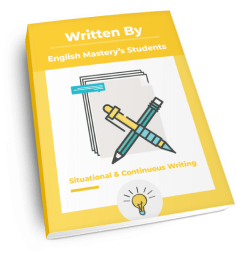
Worried You Write Off-Topic for Essays?
The most serious mistake students make is to write off-topic, rendering the entire essay irrelevant to the question.
No matter how perfect your language is, the best possible score you can get is between the 15 – 18 range, which means a C grade.
Keeping this in mind, let’s discuss one key step that effectively helps you avoid wasting the entire 50 minutes writing about something that doesn’t even address the question.
For clear explanation and illustration, we will focus on Personal Reflective Questions in this post.
I encourage my students to select them because there is a lot of space for creativity which helps you demonstrate the depths of your thoughts in your growing up years. It’s an easy way to stand out in your writing.
Examples
1. Describe a place which means a great deal to you. Why is it so important? 2017 English O Level Paper
2. What are your ambitions for the future? Explain how you plan to achieve them, including any possible difficulties. 2016 English O Level Paper
3. Describe the possession that matters most to you and explain why you would never be prepared to part with it. 2015 O Level Paper
That’s why mindfulness is such a great practice to have. You can read more about what I wrote on mindfulness and how it is crucial to your English Paper 1 here.
Mindfulness is a way of befriending ourselves and our experience.
– Jon Kabat-Zinn
Coming back to the subject of avoiding writing off-topic, you need to look for instructional words like “describe”, “explain”, “how”, “write about”, etc.
They tell you the specific actions to take. Also, you want to highlight these words whenever you see them.
Don’t take it for granted that you understand what these simple words mean. This is where many students (even those who can write very well) become complacent and make mistakes.
Let’s consider this past year O Level question.
[Question]
Write about an incident you still remember from your early childhood. Why do you think it has remained in your mind so clearly?”
Take a minute to study the question above. Can you identify the instructional words?
Here are the instructional words in bold.
[Question]
Write about an incident you still remember from your early childhood.
Why do you think it has remained in your mind so clearly?
Did you notice that there are two different instructions in this question? As much as possible, you should equally address them in your essay.
"Write About..."
“Write about” means to give details about the event. You can do so by using:
- Your 5 Senses – touch, smell, hearing, sight & taste.
- Spatial Order – describe what you see from left to right, right to left, up to down.
- Chronological Account – events that happened according to time.
This first part where you narrate the event should be easy for most students.
However, one big mistake students make is to write too much about the incident and ignore the second part of the question.
They use up their energy and time to recount the entire event without paying attention to the second part of the question which says “Why do you think”.
"Why do you think..."
“Why do you think” means to explain or spell out your reasons for remembering that event so clearly.
It is easy to think of reasons. However, is any reason good reason?
Not really.
You’re answering a Personal Reflective essay. Hence, a good reason is one that is personal to you based on your own experience, reflection and contemplation.
The more you’re able to offer meaningful insights into your own life, the better it is.
Let me give you my comments (which you will see in yellow) on a few examples to illustrate my point.
Early Childhood Memory
At about 3 to 4 years of age, I was crying hysterically when dad left me at childcare. I held on to his leg with my feeble arms in a frenzy to make him stay.
2nd Part of Question
Why do you think it has remained in your mind so clearly?
Reason 1
It was very dramatic so it is edged in my memory.
This reason is too general. It doesn’t demonstrate any consideration over the significance of the event.
It will also be difficult for the student to further elaborate on this reason. There’s only so much you can write about how dramatic the event was.
Reason 2
I still feel sad thinking about it now.
The student recognises his or her own current feeling towards the past event, showing that some attempt is made to understand why the event is remembered vividly.
Reason 3
I am regularly reminded of this event in my life because even as a teenager, I feel the same sense of abandonment whenever I say goodbye to my friends after a day out together. It does not make logical sense but I can never shake that feeling off.
There’s a strong relevance to the impact on the student’s current life.
The student has also managed to identify the emotion behind crying hysterically as “a sense of abandonment”.
It takes a lot of reflection and self-awareness to discover this.
I hope the examples above give you a better idea of what good reasons are.
Everyone’s experience is different and there is no right or wrong answer. What you want is to think deeply and make pondering a lifestyle. Only then can you offer meaningful insights to your reader.
Why is this important?
According to the Band Descriptors which O Level examiners refer to for grading your essay, you have to keep “interest aroused and sustained” to get a high band score.
What better way to keep your reader’s interest than to offer interesting insights into your own life? That’s why I advocate mindfulness so much throughout my blog and teaching.
As a reminder, when you see the following words, you should spell out your reasons and give elaborations or examples for them.
- How
- Explain
- Why
- Why do you think
Have you learned anything from this blog post?
I would love to hear from you!
Leave a comment and tell me what new lessons you have learned




